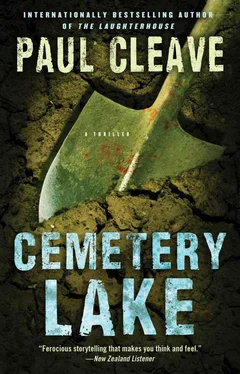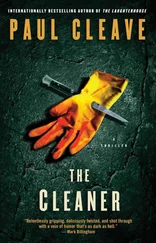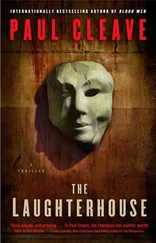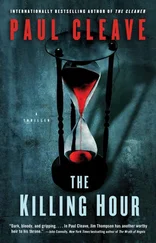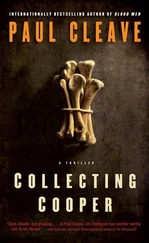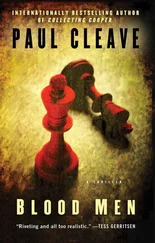Paul Cleave - Cemetery Lake
Здесь есть возможность читать онлайн «Paul Cleave - Cemetery Lake» весь текст электронной книги совершенно бесплатно (целиком полную версию без сокращений). В некоторых случаях можно слушать аудио, скачать через торрент в формате fb2 и присутствует краткое содержание. Год выпуска: 2008, ISBN: 2008, Издательство: Atria Books, Жанр: Триллер, на английском языке. Описание произведения, (предисловие) а так же отзывы посетителей доступны на портале библиотеки ЛибКат.
- Название:Cemetery Lake
- Автор:
- Издательство:Atria Books
- Жанр:
- Год:2008
- ISBN:9781451677836
- Рейтинг книги:3 / 5. Голосов: 1
-
Избранное:Добавить в избранное
- Отзывы:
-
Ваша оценка:
- 60
- 1
- 2
- 3
- 4
- 5
Cemetery Lake: краткое содержание, описание и аннотация
Предлагаем к чтению аннотацию, описание, краткое содержание или предисловие (зависит от того, что написал сам автор книги «Cemetery Lake»). Если вы не нашли необходимую информацию о книге — напишите в комментариях, мы постараемся отыскать её.
Cemetery Lake — читать онлайн бесплатно полную книгу (весь текст) целиком
Ниже представлен текст книги, разбитый по страницам. Система сохранения места последней прочитанной страницы, позволяет с удобством читать онлайн бесплатно книгу «Cemetery Lake», без необходимости каждый раз заново искать на чём Вы остановились. Поставьте закладку, и сможете в любой момент перейти на страницу, на которой закончили чтение.
Интервал:
Закладка:
The main doors are heavy and made from oak, as if to stop the weak from leaving or tempt the grieving to turn away. The nurse behind the reception desk smiles at me. Her dark red hair matches the sunset in the painting behind her.
“Hi, Theo. What have you done with the weather?”
I fake a smile of my own, the type anybody with social skills would apply when the weather suddenly becomes the topic of conversation. “Tomorrow I’m organizing sun. God owes me a favor.”
She nods, maybe agreeing that yes He does. “Flowers for me this time?” she asks, like she always does, like she always will.
The nurses and doctors are always nice, always friendly, always professional, their questions and pleasantries always clichéd. The alternative is unthinkable. You’d ask how their day was going and they would tell you the truth and you’d never come back.
“Next time,” I say, which is what I say every time. “How is she?”
“She’s doing fine, Theo. But what about you? Is that you I saw on the news?”
“Yeah, it’s been one of those crazy days.” A fairly accurate summation, I feel. Not that all crazy days end up with somebody swimming in a lake full of corpses.
She nods. “Every day this city shows us a little more how things don’t make sense.”
“Sometimes I think Christchurch is broken,” I say, “and nobody is ever going to fix it.”
I walk down the corridor, passing empty seats and closed doors and a nurses’ station that looks empty, but most likely isn’t. The entire floor is speckled green linoleum, the sort that is easy to clean blood and vomit and shit off and will last two hundred years. The day is cold, but the air in here is comfortable. It’s always comfortable, and so it ought to be. Some of the people in care here don’t know how to complain, and some who do know simply don’t have the ability anymore. There are more paintings with water and sunsets, peaceful scenes that are perhaps supposed to help calm the residents here before they move on from this world and into the next. There are pots full of artificial plants. And there are decorations for the people who come here who are on the verge of losing it.
I climb a flight of stairs, and halfway down another corridor I stop at Bridget’s room. The door is open. She is sitting by the window, looking out at the misty rain and the trees and the lack of good weather that the nurses mention every time I arrive. She seems interested in all of it. I don’t know whether she hears me come in. I close the door behind me. She keeps staring outside.
“Hey, babe, I’ve missed you,” I say, but she doesn’t answer.
I take yesterday’s flowers out of the vase and put today’s flowers in. She doesn’t notice. She doesn’t notice as I shuffle them around in an attempt to make them look nicer. I sit in the chair next to her and take her hand in mine. It’s warm. It’s always warm, no matter how cold the room gets. I’m glad for it, because it helps remind me my wife is still alive.
She occasionally blinks as I tell her about my day. There is no expression on her face as I run a brush through her hair, stroking it over and over, searching for the recognition that isn’t there. She does not laugh when I tell her how I slipped into the water. She doesn’t chide me for not telling Patricia Tyler that her daughter has been dead the entire time she has been missing. Other noises-the shuffling of patients, the squeaking of caster wheels-come from the care home, which, for the last few years, I have quietly nicknamed Death Haven. I’m not sure why I’ve come up with the name. I’m not sure whether thinking of it as Death Haven has made it more personal to me or less. Every day I have this romantic notion that I will come in here and Bridget will look up at me and smile. Every day. But she doesn’t. I hold on to the hope, I have become attached to it sentimentally, in the same way Mrs. Tyler has become attached to the idea her daughter has run away and is living the perfect life in a perfect town and is so perfectly happy she just hasn’t had the chance to call.
I keep talking until my throat is sore and I’m out of words. Bridget has remained in her catatonic state the entire time, happy in the world she is in, or perhaps sad; I wish I had a way of knowing. The window and the trees beyond hold for her the same fascination as they have done every day for the last two years. I feel exhausted, as I always do when I purge myself of the day’s events. The silence in the room is peaceful, and in these quiet times I often think that I would be better off if I could be catatonic too, unknowing and unfeeling, and keeping Bridget company. I sit holding her hand for a few more minutes, then I stand, pulling her hand up slightly. She comes with me and steps toward the bed. Her actions are involuntary, her body just following the motions. She can move from the bed to the chair, and back again. Sometimes the staff will find her standing in the corridor, motionless, and twice she has made it down into the foyer. Guide a glass up to her lips and she can drink. Raise a fork to her mouth and she can eat. But she cannot fend for herself, cannot speak, cannot look at you with an expression that suggests she knows you are there. Everything is a thousand miles away, and her eyes are fixed on that point in the distance, continually searching, searching, but never finding.
She lies down. I kiss her on the side of her cool face-her hands are always warm, her cheeks always cool-then slowly make my way from her room. I don’t turn back. I never do, not these days. I will see her tomorrow. And the day after that. And the day after.
Patricia Tyler isn’t the only person in this city playing the waiting game. Or holding out hope.
Outside, the cold air feels like silk against my face. I stand next to my car for nearly five full minutes. I stand doing nothing as the rain dampens my jacket. I’m not even really sure whether I’m thinking about my wife or dead girls or bad luck and bad omens, all I’m really doing is getting wet and not caring too much about it. Finally I find the strength to drive away.
CHAPTER NINE
I turn my cell phone on and wait for it to ring, but it doesn’t. Could mean people are getting killed elsewhere in the city and the reporters flocking there have forgotten about me. Could be the police know who put the bodies in the water and don’t feel the need to let me know. Could be Tracey hasn’t noticed the ring missing on the dead girl’s finger and I’m sailing through trouble-free waters. Could be none of that. Might simply be a poor signal. Or that taking it for a swim has finally caught up with the inner components.
I go through the motions of changing gears and avoiding other cars before realizing I’m not heading home, or even to my office, but back to the cemetery where my day suddenly became interesting. Where there is death there is life-at least at the moment. Police cars are scattered across the landscape, but mostly localized by the lake. They are no longer guarding the entrance. I ignore them and head to the opposite side of the cemetery where the dead are still at peace.
I make the walk through the dark without need of a flashlight. It’s a walk I could make with my eyes closed. The grass is wet and soon the bottoms of my pants and shoes are wet.
It’s been a while since I last stood over my daughter’s grave. After her funeral, I never wanted to come back. Seeing the smooth headstone with the brass plate carved with her name and the dates hurt too much. But it hurt even more staying away, and I ended up visiting her grave two or three times a week for the first year, and less often since then, and not at all in two months now. The doctors tell me they don’t think Bridget knows that Emily is dead or even that Emily ever existed. I hope they’re right-though I’m not sure what kind of person that makes me. Emily didn’t have the good luck to become catatonic, but the bad luck to be killed: she had twice as many bones in her body broken as my wife; she hit the pavement just as hard, just as awkwardly, and just like that she was gone. No luck there at all, unless you count bad luck.
Читать дальшеИнтервал:
Закладка:
Похожие книги на «Cemetery Lake»
Представляем Вашему вниманию похожие книги на «Cemetery Lake» списком для выбора. Мы отобрали схожую по названию и смыслу литературу в надежде предоставить читателям больше вариантов отыскать новые, интересные, ещё непрочитанные произведения.
Обсуждение, отзывы о книге «Cemetery Lake» и просто собственные мнения читателей. Оставьте ваши комментарии, напишите, что Вы думаете о произведении, его смысле или главных героях. Укажите что конкретно понравилось, а что нет, и почему Вы так считаете.
